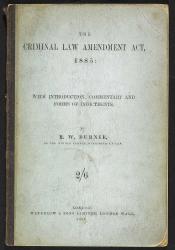Labouchere Amendment of 1885
The Labouchere Amendment, otherwise known as The Criminal Law Amendment of 1885, was put into place to further criminalize homosexual relations, more specifically it targeted the "gross indecencies" of female relations like sodomy, though it was attributed to relations between men as well. This act was named after Henry Du Pre' Labouchere. Labouchere was a leading advocate for liberal freedoms, though he argued strongly against the allowance of homosexual relations. He believed that anyone caught with a member of the same sex should face seven years of hard labor like walking on a treadmill and picking apart rope fibers. In the case of the amendment, two years of hard labor was approved. Because of the vast uncertainty of what it meant to be considered homosexual or having had homosexual relations, those accused would often be blackmailed. This earned the amendment the additional name of, "The Blackmailer's Charter."
It was this the Labouchere Amendment that would prove problematic for our author, Oscar Wilde, as it was the reason why they were able to charge him with sodomy. Wilde had been accused by Marquis John Sholto Douglas in February of 1895 of being or posing as a sodomite. This accusation was left on a card for Wilde in a gentleman's club, the Albemarle. Wilde would attempt to get a warrant for Douglas suggesting criminal libel, but instead, the Marquis would formulate a case against him, proving detrimental for Wilde. Oscar was charged in the case, forced to have served two years of hard labor. The Picture of Dorian Gray, as well as his other works, were utilized against him as evidence for his acceptance of homosexual relations. It would not be until 1967 that this amendment would be removed from English law.
Yes, well such a law is certain to be of issue for my Henry. He doesn't think me aware of his folly behaviors. If I had not been his wife for so long, one would think I would not have taken notice. But, do I see. I see his longing stares at dear Mr. Dorian Gray. I see how he likes to charm him, filling his head with crazed notions of vanity; showering him with compliments that I have not borne personal witness to in years. Though, I could not bear to see my Henry imprisoned for such behaviors, no matter how grotesque. We both know of what is done when we are not in each other's presence, I have my liaisons too, though I would never act upon them. So, who am I to wish the ill fate of my dear? Besides, no words can do harm if not acted upon. May he not act upon them. What would become of him if he were to be accused by another? Or if he were to act on his words and be caught? No, I could not bear the thought. He wouldn't. While he may have his curiosities, Henry would never betray me in such a way. He would never lie with another man, oh, the horror. The indecent act of a mentally deranged being! Oh, no. No, no, no. I cannot believe that he would. I would hope that he would not. But…but...what if he would? What if he has?
“The Criminal Law Amendment Act, 1885.” The British Library, The British Library, 11 Mar. 2014, www.bl.uk/collection-items/the-criminal-law-amendment-act-1885.

